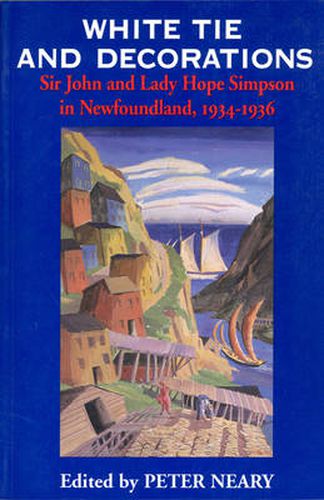Readings Newsletter
Become a Readings Member to make your shopping experience even easier.
Sign in or sign up for free!
You’re not far away from qualifying for FREE standard shipping within Australia
You’ve qualified for FREE standard shipping within Australia
The cart is loading…






In February 1934, a financial emergency created by the Great Depression forced the suspension of self-government in Newfoundland. Britain guaranteed Newfoundland’s debt and appointed a Commission of Government. Among the first members named to the new government was Sir John Hope Simpson, whose portfolio included responsibility for fishing, forestry, mining, and agriculture. This book is a selection from the many letters written from Newfoundland to family members in England by Sir John and Lady Hope Simpson (familiarly known as Quita). It recalls in vivid detail the terrible decade of the 1930s. The reader relives the era through the eyes of a couple who had a unique and informed perspective on events in Newfoundland and Labrador.
Sir John Hope Simpson was a man of wide international experience and exceptional administrative ability. His correspondence is candid and direct - that of an insider. Quita’s letters reveal a perceptive and inquisitive nature and a pervading social concern. Both write about their progressive, even utopian, ideas. They travelled extensively in the country, met a wide range of people, and recorded their experiences in letters that capture the essence of the time.
Peter Neary’s edition is based on the collection of Hope Simpson papers at Balliol College, Oxford. His selection from the Newfoundland correspondence is complemented in the book by maps and photographs. Neary’s introduction lays the groundwork for an understanding of the letters and the milieu of the Hope Simpsons.
$9.00 standard shipping within Australia
FREE standard shipping within Australia for orders over $100.00
Express & International shipping calculated at checkout
In February 1934, a financial emergency created by the Great Depression forced the suspension of self-government in Newfoundland. Britain guaranteed Newfoundland’s debt and appointed a Commission of Government. Among the first members named to the new government was Sir John Hope Simpson, whose portfolio included responsibility for fishing, forestry, mining, and agriculture. This book is a selection from the many letters written from Newfoundland to family members in England by Sir John and Lady Hope Simpson (familiarly known as Quita). It recalls in vivid detail the terrible decade of the 1930s. The reader relives the era through the eyes of a couple who had a unique and informed perspective on events in Newfoundland and Labrador.
Sir John Hope Simpson was a man of wide international experience and exceptional administrative ability. His correspondence is candid and direct - that of an insider. Quita’s letters reveal a perceptive and inquisitive nature and a pervading social concern. Both write about their progressive, even utopian, ideas. They travelled extensively in the country, met a wide range of people, and recorded their experiences in letters that capture the essence of the time.
Peter Neary’s edition is based on the collection of Hope Simpson papers at Balliol College, Oxford. His selection from the Newfoundland correspondence is complemented in the book by maps and photographs. Neary’s introduction lays the groundwork for an understanding of the letters and the milieu of the Hope Simpsons.